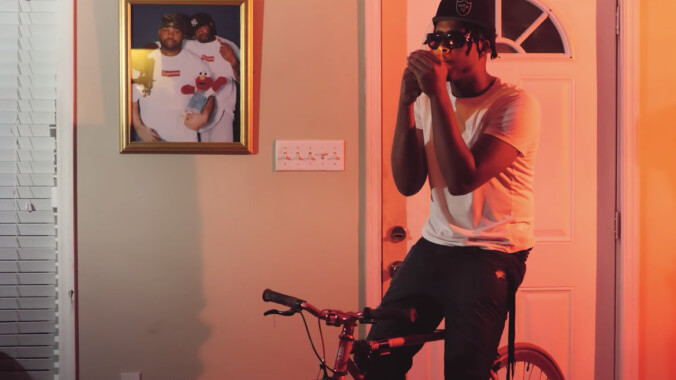Gather 'round, children, for it's time to learn about "squeak rap"

Somebody get 645AR on Sesame Street. Using a method he calls “squeaking,” the viral rapper’s been churning out bangers that sound like something from a demented children’s show.
His most recent track “4 Da Trap” is by far his most popular, earning so many views on Twitter that his account was suspended (Twitter suspected it was spam). The lyrics are virtually indecipherable through 645AR’s ridiculously high-pitched mumble rapping, but that’s oddly part of the appeal. “He sound like a mosquito if it had access to a studio,” one Twitter used joked. In fact, most of Twitter seems to think his fan base consists of bugs and mice.
645AR only recently stumbled upon his Elmo-adjacent style after about a year of releasing more typical R&B songs. It all began with “Crack,” which blends his regular voice with his squeak. It got some attention, but most assumed the cartoonish voice had to be a gimmick. Yet 645AR’s voice is not edited, he said in a recent interview with Complex, and a recent Genius video featuring 645AR (see it below) proves he’s not using autotune. “There’s a lot of emotion in it. I just want people to feel what I’m going through,” he told Genius. But, despite his sincerity, he still embraces the memes—he even posted an origin story video on YouTube of Mickey Mouse possessing him.
645AR may have popularized the genre, but he’s not the first rapper to flex their squeak. His work bears the most striking resemblance to Voochie P, a less popular artist with a similar—albeit clearer—sound. But Voochie P’s chipmunk-esque tunes didn’t achieve that same level of virality, perhaps because his songs are less bizarre, more palatable. He didn’t fully commit to the Elmo technique, whereas 645AR has a willingness to follow squeak rapping to its inevitable artistic end, knowing the style is as shareable as it is distinct. People amused by squeak rap, after all, can’t keep it to themselves; it must be given unto others.
This shareability is part of squeak rap’s appeal, no doubt, but there’s also satire, whether intentional or unintentional, to be found in someone using a Mickey Mouse voice to brag about fat stacks, women, and other hip hop cliches. Combine that with the vulnerability inherent to the squeak and suddenly sarcasm and sincerity no longer seem mutually exclusive. You can try to ridicule it but you can’t; it’s self-parodying. It’s music for the post-post ironic culture.